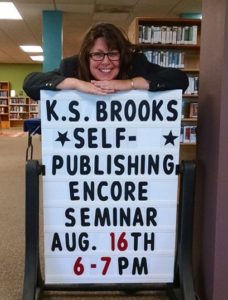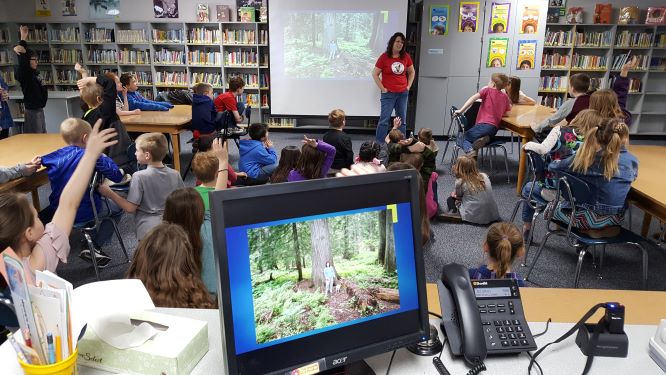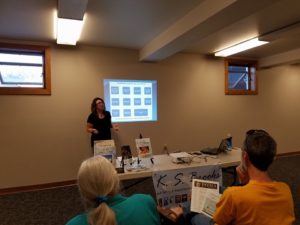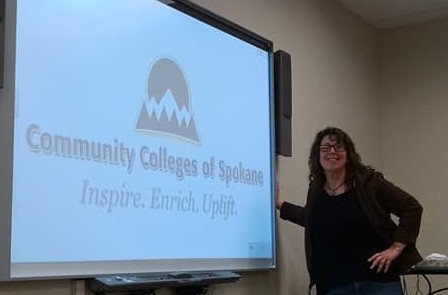 K. S. Brooks is available to speak to audiences ranging from elementary schoolers to retirees. She is an adjunct faculty member for the Community Colleges of Spokane and has presented writing and publishing-related classes and workshops for CCS as well as Stevens County (WA) libraries and school systems, Whitman County (WA) schools, the Emerald City Writers Conference (RWA) in Bellevue, the Idaho Writers League annual conference, Bay to Ocean Writers Conference (MD), Maryland Writers Association annual conference, University of Massachusetts – Lowell, the Jewish Community Day School of Rhode Island, and other venues. Both traditionally and self-published, executive director for the publishing “superblog” Indies Unlimited, and the author of over 30 titles, Ms. Brooks is uniquely qualified to teach others about writing, the publishing process, and self-publishing.
K. S. Brooks is available to speak to audiences ranging from elementary schoolers to retirees. She is an adjunct faculty member for the Community Colleges of Spokane and has presented writing and publishing-related classes and workshops for CCS as well as Stevens County (WA) libraries and school systems, Whitman County (WA) schools, the Emerald City Writers Conference (RWA) in Bellevue, the Idaho Writers League annual conference, Bay to Ocean Writers Conference (MD), Maryland Writers Association annual conference, University of Massachusetts – Lowell, the Jewish Community Day School of Rhode Island, and other venues. Both traditionally and self-published, executive director for the publishing “superblog” Indies Unlimited, and the author of over 30 titles, Ms. Brooks is uniquely qualified to teach others about writing, the publishing process, and self-publishing.
WRITING TOPICS
WRITING
Using Flash to Tighten Your Writing – Whether you write fiction or non-fiction, flash fiction exercises can help writers noticeably improve all types of writing including business, journalism, copywriting, and more. This one-hour class will cover the definition and types of flash fiction, the keys to writing it, how it benefits other types of writing, filter words, and other resources to help authors hone their craft.
Learning objectives include:
1. Understanding the five elements of flash fiction
2. Being able to identify filter words
3. Eliminating extra and non-essential words
4. Replace “weak” verbs with “strong” verbs
Students will create their own story based on a photographic prompt, and will use the tools learned in class to edit and polish them. Handouts, both print and electronic, will be provided to students so they can continue to use the resources introduced to them during class.
How to Write a Press Release – For entrepreneurs, non-profit groups, businesses, and anyone who might need to write a press release – Ms. Brooks provides a how-to on writing a release, along with a look into the news-side of it, and how and where to disseminate them. A bonus about writing calendar announcements is included.
Writing is Fun… and Funny – Designed for middle school students, Ms. Brooks employs humor to hit home with kids about the importance of using the right word in the right place as well as proper punctuation and spelling.
Go Anywhere – designed for elementary school students, Ms. Brooks shows kids how using their imagination can bring places and things to life in stories.

PUBLISHING
How to Produce a Quality Book – Agents and publishers want a finished product – and authors want to impress them – so polishing it to the max is just as important as what writers would do if they were self-publishing.
Learning objectives include:
1. The different types of editing
2. Writing an effective book “blurb”
3. Creating a professional-looking book cover
4. How to accomplish these tasks affordably
Students will learn about:
Different methods of editing – self (will include techniques), alpha readers, beta readers, ARC readers, proofreaders, and professional editors – how to get your manuscript polished as affordably as possible.
Producing a polished book blurb/description (back cover blurb, Amazon sales blurb) will also be covered as writers seeking traditional publication will most likely need this for their pitch letter, and self-publishers will need it to sell their books.
For self/indie publishers, elements of a professional-looking book cover will be part of the class, including the importance of font and image genre, legibility in thumbnail, and more, along with resources to do it low cost and/or free.
Book formatting – what it is and how to do it for free – will also be covered, as well as book titling, which will be useful to both traditional and self-publishing authors.
 Introduction to Publishing – There are so many different ways to publish a book nowadays – how does an author know what’s right for him or her?
Introduction to Publishing – There are so many different ways to publish a book nowadays – how does an author know what’s right for him or her?
Learning objectives include:
1. The different types of publishing
2. How to identify a scammer
3. The book production process
4. How to self-publish
The different types of publishing will be covered, including traditional, vanity, predatory, assisted, and self-publishing. The class is designed to give writers an insight into the types of publishing available so they can make educated decisions on which method they would like to pursue while being aware of possible scams. A spotlight on self-publishing will include the production processes for two successful authors as well as the different platforms for publishing and distributing both eBooks and print books.
How to Produce and Publish a Quality Book – The classes above are combined into a two-hour program to give writers a sense of what it takes to succeed as a published author.

To book Ms. Brooks for your next conference, event, or class, please contact [email protected].